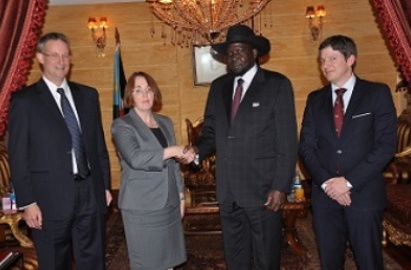S. Sudan summons U.S. charge d’affaires in Juba over sanctions
September 11, 2017 (JUBA)- South Sudan’s government has protested the imposition of sanctions placed on key officials, summoning the U.S. charge d’affaires in Juba to protest targetted sanctions on government officials.

“We believe sanctions are not the best ways to address the issues. There are many ways and one of the ways is through the revitalization of the peace agreement which is being handled by IGAD (Intergovernmental Authority on Development) and the national dialogue which has been launched by the leadership of the country. These are forums through which stakeholders can participate and the solution can come out from these discussions,” said foreign spokesman Mawien Makol.
The South Sudanese diplomat further said the government is not happy with the actions of the United States and was the reason it called the US representative to convey the message for onward delivery.
He described relations between the two countries and people as good and therefore wanted to know the reasons for imposing sanctions without seeking the views of the government before taking actions.
Last Wednesday the U.S. Treasury Department on Wednesday, Sept. 6 imposed sanctions and travel ban that include an asset freeze on South Sudan’s deputy defence chief, Malek Reuben, the information minister, Michael Makuei Lueth and the ex-military chief of staff, Paul Malong.
Washington said the sanctions were imposed on the two government officials and the former general for their alleged roles in destabilizing the African nation and “enriching” themselves through corruption.
Two days later on 8 September in a joint meeting of the UN Security Council and the African Union Peace and Security Council in Addis Ababa, the American diplomats raised again the imposition of a UN arms embargo on the South Sudan.
Washington blames Juba for not implementing the peace agreement signed in August 2015. During the joint meeting, U.S. diplomats also supported the idea that elections should not be held next year before the full implementation of the IGAD brokered deal.
(ST)
